情态动词(完整整理版)
- 格式:docx
- 大小:116.74 KB
- 文档页数:6
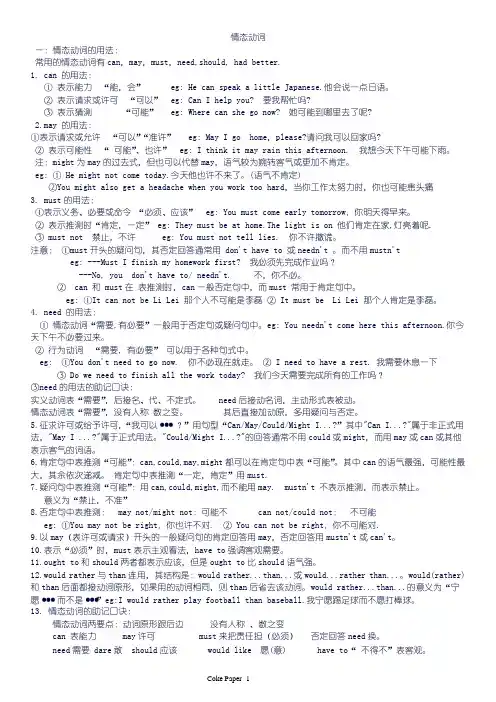
情态动词一:情态动词的用法:常用的情态动词有can,may,must,need,should, had better.1. can 的用法:①表示能力“能,会” eg: He can speak a little Japanese.他会说一点日语。
②表示请求或许可“可以” eg: Can I help you? 要我帮忙吗?③表示猜测“可能” eg: Where can she go now? 她可能到哪里去了呢?2.may 的用法:①表示请求或允许“可以”“准许” eg: May I go home,please?请问我可以回家吗?②表示可能性“可能”、也许” eg: I think it may rain this afternoon. 我想今天下午可能下雨。
注:might为may的过去式,但也可以代替may,语气较为婉转客气或更加不肯定。
eg: ① He might not come today.今天他也许不来了。
(语气不肯定)②You might also get a headache when you work too hard,当你工作太努力时,你也可能患头痛3. must的用法:①表示义务、必要或命令“必须、应该” eg: You must come early tomorrow.你明天得早来。
②表示推测时“肯定,一定” eg: They must be at home.The light is on 他们肯定在家,灯亮着呢.③ must not 禁止,不许 eg: You must not tell lies. 你不许撒谎。
注意:①must开头的疑问句,其否定回答通常用 don't have to 或needn't 。
而不用mustn'teg: ---Must I finish my homework first? 我必须先完成作业吗?---No, you don't have to/ needn't. 不,你不必。
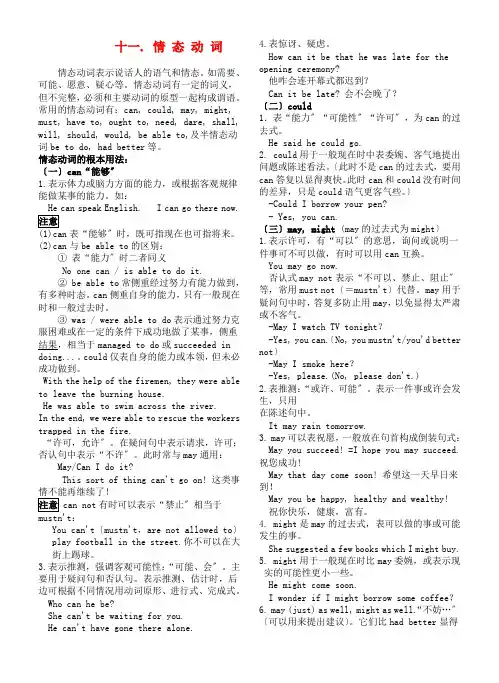
十一.情态动词情态动词表示说话人的语气和情态。
如需要、可能、愿意、疑心等。
情态动词有一定的词义,但不完整,必须和主要动词的原型一起构成谓语。
常用的情态动词有:can, could, may, might, must, have to, ought to, need, dare, shall, will, should, would, be able to,及半情态动词be to do, had better等。
情态动词的根本用法:〔一〕can“能够〞1.表示体力或脑力方面的能力,或根据客观规律能做某事的能力。
如:speak English. I can go there now.表“能够〞时,既可指现在也可指将来。
(2)can与be able to的区别:①表“能力〞时二者同义No one can / is able to do it.② be able to常侧重经过努力有能力做到,有多种时态。
can侧重自身的能力,只有一般现在时和一般过去时。
③ was / were able to do表示通过努力克服困难或在一定的条件下成功地做了某事,侧重结果,相当于managed to do或succeeded in doing...。
could仅表自身的能力或本领,但未必成功做到。
With the help of the firemen, they were able to leave the burning house.He was able to swim across the river.In the end, we were able to rescue the workers trapped in the fire.“许可,允许〞。
在疑问句中表示请求,许可;否认句中表示“不许〞。
此时常与may通用:May/Can I do it?This sort of thing can't go on! 这类事有时可以表示“禁止〞相当于:You can't〔mustn't,are not allowed to〕play football in the street.你不可以在大街上踢球。
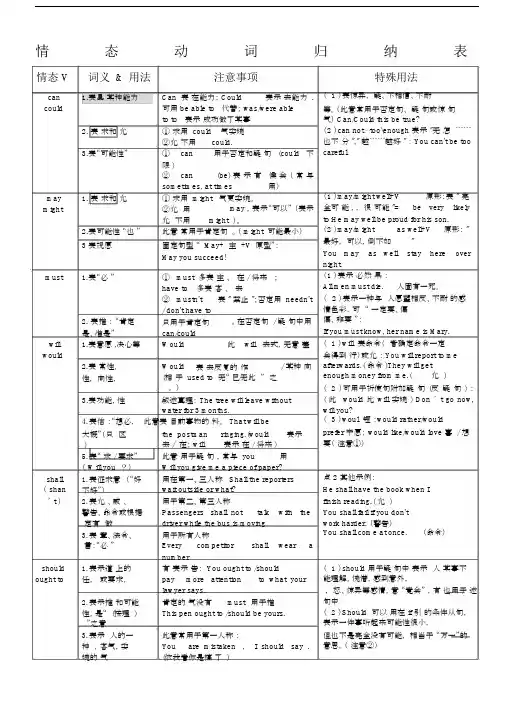
情态动词归纳表情态 V词义&用法注意事项特殊用法can 1.表具某种能力Can 表在能力; Could 表示去能力 . could 可用 be able to 代替; was/were ableto to 表示成功做了某事2. 表求和允① 求用 could 气委婉②允不用could.3.表“可能性”①can 用于否定和疑句 (could 不限 )can (be) 表示有候会(常与②sometimes, at times 用)may 1. 表求和允① 求用 might 气更委婉。
might ②允用may ,表示“可以” (表示允不用might )。
2.表可能性“也”此意常用于肯定句。
( might 可能最小)3 表祝愿固定句型“ May+ 主 +V 原型”:May you succeed! ( 1 )表惊异、疑、不相信、不耐等。
(此意常用于否定句、疑句或惊句气) Can/Could this be true?(2 )can not ⋯too\enough 表示 "无怎 ``````也不分 "," 越``````越好 " : You can't be too careful.(1 )may/might well+V原形:表"完全可能 , ,很可能 "= be very likely to:He may well be proud for his son.(2 )may/might as well+V原形:" 最好,可以,倒不如"You may as well stay here over night.must 1.表“必”① must 多表主、在 / 将来 ;have to 多表客、去② mustn't 表 " 禁止 ";否定用 needn't/ don't have to2. 表推:“肯定只用于肯定句。
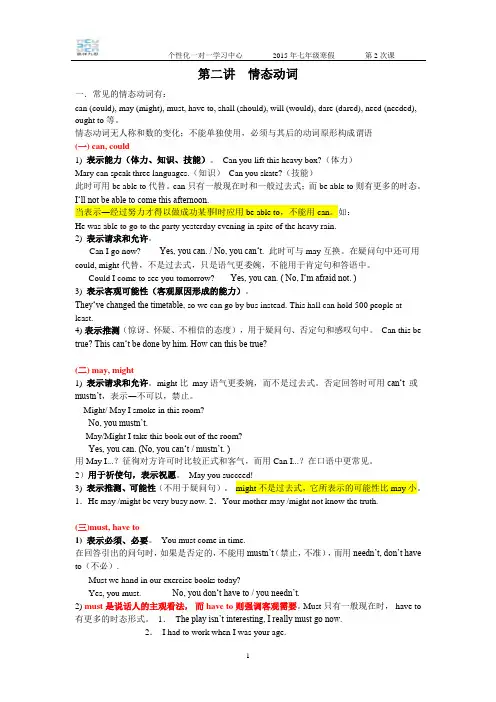
第二讲情态动词一.常见的情态动词有:can (could), may (might), must, have to, shall (should), will (would), dare (dared), need (needed), ought to等。
情态动词无人称和数的变化;不能单独使用,必须与其后的动词原形构成谓语(一) can, could1) 表示能力(体力、知识、技能)。
Can you lift this heavy box?(体力)Mary can speak three languages.(知识)Can you skate?(技能)此时可用be able to代替。
can只有一般现在时和一般过去式;而be able to则有更多的时态。
I‘ll not be able to come this afternoon.当表示―经过努力才得以做成功某事‖时应用be able to,不能用can。
如:He was able to go to the party yesterday evening in spite of the heavy rain.2) 表示请求和允许。
-----Can I go now? ----- Yes, you can. / No, you can‘t. 此时可与may互换。
在疑问句中还可用could, might代替,不是过去式,只是语气更委婉,不能用于肯定句和答语中。
---- Could I come to see you tomorrow? ---- Yes, you can. ( No, I‘m afraid not. )3) 表示客观可能性(客观原因形成的能力)。
They‘ve changed the timetable, so we can go by bus instead. This hall can hold 500 people at least.4)表示推测(惊讶、怀疑、不相信的态度),用于疑问句、否定句和感叹句中。
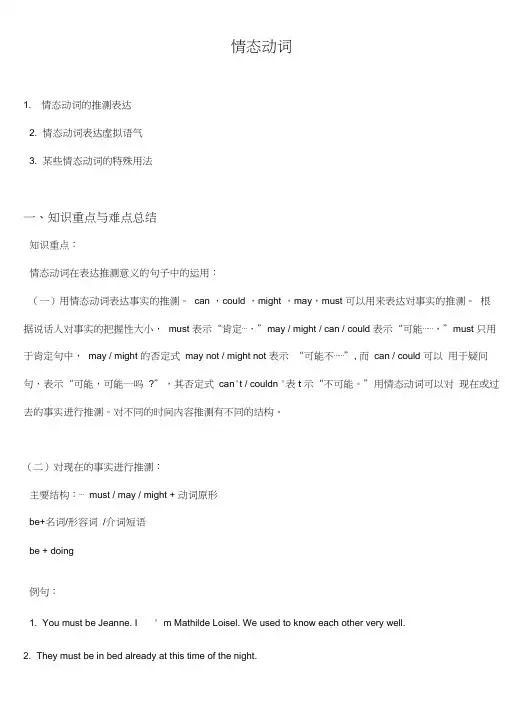
情态动词1. 情态动词的推测表达2. 情态动词表达虚拟语气3. 某些情态动词的特殊用法一、知识重点与难点总结知识重点:情态动词在表达推测意义的句子中的运用:(一)用情态动词表达事实的推测。
can ,could ,might ,may,must 可以用来表达对事实的推测。
根据说话人对事实的把握性大小,must 表示“肯定⋯,”may / might / can / could 表示“可能⋯⋯,”must 只用于肯定句中,may / might 的否定式may not / might not 表示“可能不⋯⋯”, 而can / could 可以用于疑问句,表示“可能,可能⋯⋯吗?”,其否定式can't / couldn '表t示“不可能。
”用情态动词可以对现在或过去的事实进行推测。
对不同的时间内容推测有不同的结构。
(二)对现在的事实进行推测:主要结构:⋯must / may / might + 动词原形be+名词/形容词/介词短语be + doing例句:1. You must be Jeanne. I ' m Mathilde Loisel. We used to know each other very well.2. They must be in bed already at this time of the night.3. The teacher must be joking.4. Freda isn ' t in class. Sheu smt be sick.5. There must be something wrong.6. She might be very clever, but she hasn ' t got much common sense.7. He may be arriving this evening.8. He may be traveling around the world.9. The keys can ' t be in the room. I have just searched it very carefully.10. Can the news be true?(三)对过去的事实进行推测:结构:情态动词+have done / been+ 名词/形容词/介词短语例句:1. Mrs. Longmans must have been a pretty girl in her youth.2. He couldn 't have seen Anna yesterday. She ' s gone abroad.3. I think I must have left my glasses in the library.4. He might have overslept again.5. Where can Tom have gone ?情态动词表达虚拟语气:表达“本来⋯”,“不然早就⋯”。
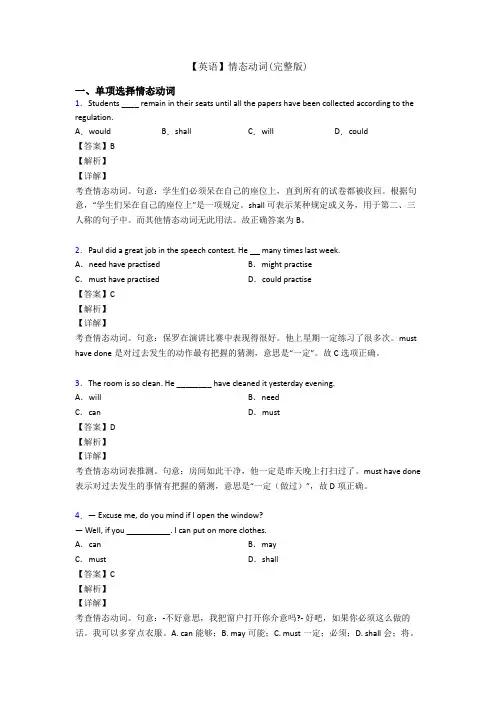
【英语】情态动词(完整版)一、单项选择情态动词1.Students ____ remain in their seats until all the papers have been collected according to the regulation.A.would B.shall C.will D.could【答案】B【解析】【详解】考查情态动词。
句意:学生们必须呆在自己的座位上,直到所有的试卷都被收回。
根据句意,“学生们呆在自己的座位上”是一项规定。
shall 可表示某种规定或义务,用于第二、三人称的句子中。
而其他情态动词无此用法。
故正确答案为B。
2.Paul did a great job in the speech contest. He many times last week.A.need have practised B.might practiseC.must have practised D.could practise【答案】C【解析】【详解】考查情态动词。
句意:保罗在演讲比赛中表现得很好。
他上星期一定练习了很多次。
must have done是对过去发生的动作最有把握的猜测,意思是“一定”。
故C选项正确。
3.The room is so clean. He ________ have cleaned it yesterday evening.A.will B.needC.can D.must【答案】D【解析】【详解】考查情态动词表推测。
句意:房间如此干净,他一定是昨天晚上打扫过了。
must have done 表示对过去发生的事情有把握的猜测,意思是“一定(做过)”,故D项正确。
4.— Excuse me, do you mind if I open the window?— Well, if you __________. I can put on more clothes.A.can B.mayC.must D.shall【答案】C【解析】【详解】考查情态动词。
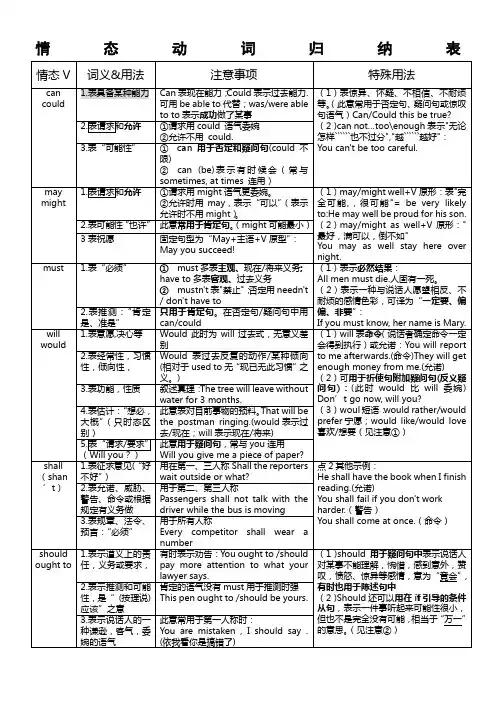
情态动词归纳表高考热点透视热点一:表猜测的情态动词的用法。
热点二:情态动词+have done情态动词+have done的用法有两种含义:1. 对过去情况的猜测。
由表猜测的情态动词+have done构成。
上表已经提到。
2. 表示与过去事实的主观设想。
有轻微的责备、后悔之意。
请参看下表:热点三:shall,will,must等1. Shall ①用于第一人称疑问句中表示说话人征求对方的意见或向对方请求。
例:—The room is so dirty. _______ we clean it?—Of course. ( 03 上海春招)A. WillB. ShallC. WouldD. Do②用于第二人称陈述句表示说话人或他人的意图、命令、允诺、警告、命令等。
例:“The interest _______ be divided into five parts, according to the agreement made by both sides,” declared the judge. (04 重庆,24)A. mayB. shouldC. mustD. shall2. Will ①表示意愿或意志。
例:I __________ argue with you.②当主语是物时,则表示“不起作用”。
例:The drawer _________ shut.3. Must 表“必须、一定要”。
例:— Who is the girl standing over there?— Well, if you _______ know, her name is Mabel. (02,天津)A. mayB. canC. mustD. shall。
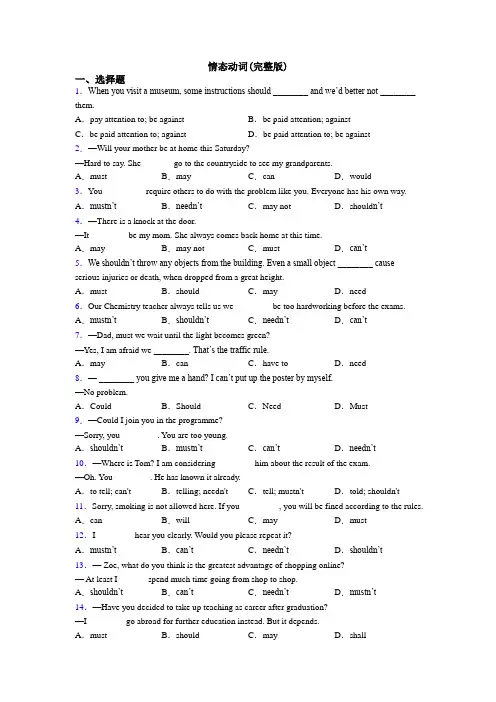
情态动词(完整版)一、选择题1.When you visit a museum, some instructions should ________ and we’d better not ________ them.A.pay attention to; be against B.be paid attention; againstC.be paid attention to; against D.be paid attention to; be against2.—Will your mother be at home this Saturday?—Hard to say. She _______go to the countryside to see my grandparents.A.must B.may C.can D.would3.You ________ require others to do with the problem like you. Everyone has his own way. A.mustn’t B.needn’t C.may not D.should n’t 4.—There is a knock at the door.—It ________ be my mom. She always comes back home at this time.A.may B.may not C.must D.can’t5.We shouldn’t throw any objects from the building. Even a small object ________ cause serious injuries or death, when dropped from a great height.A.must B.should C.may D.need6.Our Chemistry teacher always tells us we ________ be too hardworking before the exams. A.mustn’t B.shouldn’t C.needn’t D.can’t7.—Dad, must we wait until the light becomes green?—Yes, I am afraid we ________. That’s the traffic rule.A.may B.can C.have to D.need8.—________ you give me a hand? I can’t put up the poster by myself.—No problem.A.Could B.Should C.Need D.Must9.—Could I join you in the programme?—Sorry, you ________. You are too young.A.shouldn’t B.mustn’t C.can’t D.needn’t 10.—Where is Tom? I am considering ________ him about the result of the exam.—Oh. You ________. He has known it already.A.to tell; can't B.telling; needn't C.tell; mustn't D.told; shouldn't 11.Sorry, smoking is not allowed here. If you ________ , you will be fined according to the rules. A.can B.will C.may D.must12.I ________ hear you clearly. Would you please repeat it?A.mustn’t B.can’t C.needn’t D.shouldn’t 13.— Zoe, what do you think is the greatest advantage of shopping online?— At least I ______ spend much time going from shop to shop.A.shouldn’t B.can’t C.needn’t D.mustn’t 14.—Have you decided to take up teaching as career after graduation?—I ________ go abroad for further education instead. But it depends.A.must B.should C.may D.shall15.Please don't make so much noise. I ________ hear the speaker very well.A.needn't B.can't C.shouldn't D.mustn't 16.—The high school entrance examination is coming!—Yes, our teacher tells us we _______ be too careful while taking exams.A.mustn't B.shouldn't C.needn't D.can't17.---Will you be back early this evening?---Yes, but I ________ be a little late. Our boss sometimes has extra work for us.A.may B.must C.need D.will18.My bike was broken yesterday,so I____walk home.A.might B.had to C.must D.could 19.—Ready? Let’s get started, Martin.— Swimming? I just ________ get used to it in winter.A.can’t B.needn’t C.mustn’t D.shouldn’t 20.You'd better __________ hard from now on, __________ you will fail the exam. A.work; and B.working; or C.working; and D.work; or 21.Mr. Black ________ be at home now. He went abroad on vacation last Friday.A.can’t B.mustn’t C.needn’t D.shouldn’t22.We've discussed every detail of this plan and have got everything ready. But still something ________ go wrong. We still have to be very careful.A.must B.should C.would D.may23.—Suzy described every detail of the accident just now.—Her memory ________ be completely back.A.shall B.need C.must D.could24.—Is that Mr Zhou?—It ________ be him. He has gone to Beijing.A.can B.may C.can’t D.shouldn’t 25.—In China, many parents complain that their children have to stay up late to do the homework.—Don’t worry. The government has realized the problem. I’m sure there ________ be good news soon.A.can B.should C.need D.must26.When people are waiting at the zebra crossing, cars and buses ________ wait and let them go first.A.must B.may C.can D.need27.—Shall I tell him the change of the time right now?—I’m afraid you ________, otherwise he will be late for the meeting.A.can B.may C.must D.need 28.—Seventy dollars for such a dress! You ________ be joking!—I’m serious. It’s made of silk from Hangzhou.A.must B.need C.will D.can29.—Who is singing next door? It sounds like a young girl’s voice.—It _________ be Jane. But she seldom sings English songs.A.need B.must C.may D.can30.You’ve got an A in the maths test again. You ________ be good at it.A.can B.may C.must D.should31.A hard-working man ________ become a great scientist, but a great scientist ________ be a hard-working man.A.can’t; can B.may not; must C.can’t; must D.may not; can 32.For the safety of the passengers, objects like guns ________ be carried on board.A.may not B.needn’t C.might not D.mustn’t 33.—The article says that a pers on’s animal sign decides his personality.—You ________ read it for fun, but don’t believe in that.A.can B.must C.shouldn’t D.needn’t 34.— What do you think of the show yesterday?— Some of them were really good but others ________ be better.A.will B.must C.need D.can35.—In China, many students have to stay up late to do their homework.—No worries. The government has realized the problem. I’m sure there ________ be good news soon.A.can B.should C.must D.need36.—I don’t care what people think.—Well, you _______ . Some opinions are worth weighing.A.should B.might C.could D.would37.You ________ drive after drinking alcohol(酒). It’s against the law.A.mustn’t B.needn’t C.couldn’t D.wouldn’t 38.You ________ be careful with the camera. It costs!A.can B.will C.should D.may39.It’s of great importance to protect the environment. Each of us ________ take an active part in it.A.can B.may C.would D.should 40.—Excuse me. I haven’t finished reading the book yet. May I keep it a bit longer?— Sorry, you ________. You must return it on time.A.needn’t B.can’t C.won’t D.shouldn’t【参考答案】一、选择题1.D解析:D【详解】句意:当你参观博物馆时,应该注意一些说明,我们最好不违反它们。
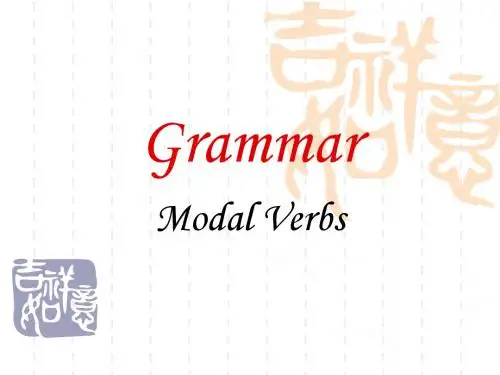
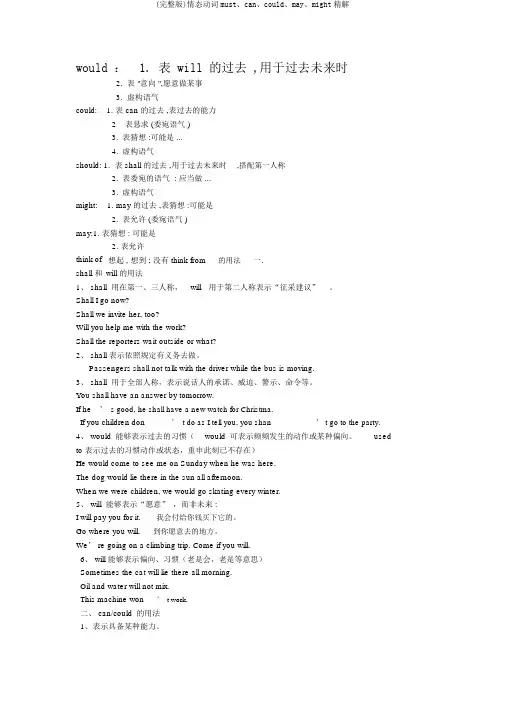
would : 1. 表 will 的过去 ,用于过去未来时2.表 "意向 ",愿意做某事3.虚构语气could: 1. 表 can 的过去 ,表过去的能力2表恳求 (委宛语气 )3.表猜想 :可能是 ...4.虚构语气should: 1. 表 shall 的过去 ,用于过去未来时,搭配第一人称2.表委宛的语气 : 应当做 ...3.虚构语气might: 1. may 的过去 ,表猜想 :可能是2.表允许 (委宛语气 )may:1. 表猜想 : 可能是think of shall 和2. 表允许想起 , 想到 ; 没有 think fromwill 的用法的用法一.1、 shall 用在第一、三人称,will用于第二人称表示“征采建议”。
Shall I go now?Shall we invite her, too?Will you help me with the work?Shall the reporters wait outside or what?2、 shall 表示依照规定有义务去做。
Passengers shall not talk with the driver while the bus is moving.3、 shall 用于全部人称,表示说话人的承诺、威迫、警示、命令等。
You shall have an answer by tomorrow.If he’ s good, he shall have a new watch for Christma.If you children don’ t do as I tell you, you shan ’ t go to the party. 4、 would 能够表示过去的习惯(would 可表示频频发生的动作或某种偏向。
used to 表示过去的习惯动作或状态,重申此刻已不存在)He would come to see me on Sunday when he was here.The dog would lie there in the sun all afternoon.When we were children, we would go skating every winter.5、 will 能够表示“愿意” ,而非未来 :I will pay you for it.我会付给你钱买下它的。
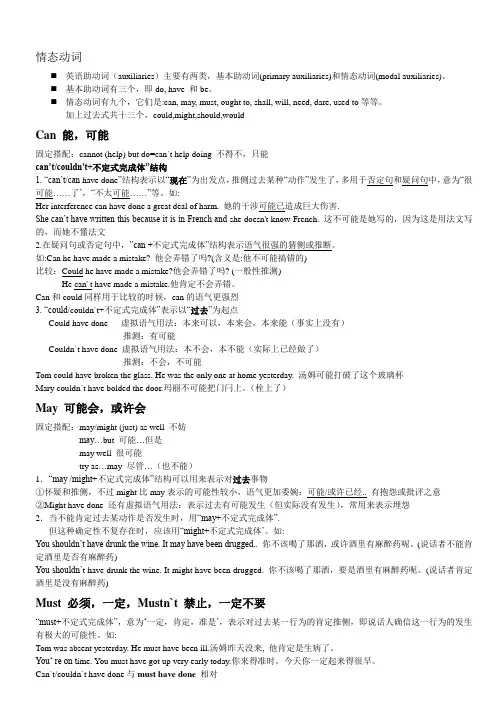
情态动词⏹英语助动词(auxiliaries)主要有两类,基本助动词(primary auxiliaries)和情态动词(modal auxiliaries)。
⏹基本助动词有三个,即do, have 和be。
⏹情态动词有九个,它们是:can, may, must, ought to, shall, will, need, dare, used to等等。
加上过去式共十三个,could,might,should,wouldCan 能,可能固定搭配:cannot (help) but do=can`t help doing 不得不,只能can’t/couldn't+不定式完成体”结构1. “can‟t/can have done”结构表示以“现在”为出发点,推侧过去某种“动作”发生了,多用于否定句和疑问句中,意为“很可能……了‟,“不太可能……”等。
如:Her interference can have done a great deal of harm. 她的干涉可能已造成巨大伤害.She can‟t have written this because it is in French and she doesn't know French. 这不可能是她写的,因为这是用法文写的,而她不懂法文2.在疑问句或否定句中,”can +不定式完成体”结构表示语气很强的猜侧或推断。
如:Can he have made a mistake? 他会弄错了吗?(含义是:他不可能搞错的)比较:Could he have made a mistake?他会弄错了吗? (一般性推测)He can' t have made a mistake.他肯定不会弄错。
Can和could同样用于比较的时候,can的语气更强烈3. “could/couldn`t+不定式完成体”表示以“过去”为起点Could have done 虚拟语气用法:本来可以,本来会,本来能(事实上没有)推测:有可能Couldn`t have done 虚拟语气用法:本不会,本不能(实际上已经做了)推测:不会,不可能Tom could have broken the glass. He was the only one at home yesterday. 汤姆可能打破了这个玻璃杯Mary couldn`t have bolded the door.玛丽不可能把门闩上。
(完整版)情态动词总结情态动词专题情态动词表示说话人的语气和态度。
如需要、愿意和怀疑等。
它们有一定的词义,但不完整,必须和主要动词的原形一起构成谓语,常用的情态动词有:can, could, may, might, must, have to, ought to, should, will, would, need, dare, shall, , be able to及半情态动词had better, would rather, have to, would like to.情态动词的基本用法:一、can1. 表示能力“能……,会……”A computer can’t think for itself; it must be told what to do.2. 表示许可,“能够……,可以……”;在疑问句中表示请求许可“能不能……,要不要……,用could表委婉语气,还可以用may。
You can go out to play when you finish your homework.--Can /Could /May I go now ?—Yes, you can/may.Could you give me a lift to the station?3. 表示猜测,通常用在疑问句中,表示惊讶、怀疑;用于否定句中,表示有把握的否定推测“不可能……”Who can it be ?那会是谁呢?Can it be true? 那会是真的吗?She can’t be waiting for you. 她不可能在等你。
He can’t have g one there alone.他不可能独自一人到那儿去。
4.(表示平时大部分时间不是这样,只是偶然发生)“有时候会……”。
Some equipment at home can be dangerous to children.Peter can be really hard to get along with even though he is a nice person in general.特别记忆:①can not/ can never…too…或cannot … enough“再……也过分,越……就越好”You can never be too careful (you can’t be careful enough )while crossing the street.②can’t help doing sth.= can’t help but do sth = can’t but do sth =can do nothing but do sth.When a close friend dies, you can’t but feel sad.③were /was able t o do sth. 表示过去设法成功地做了某事,could没有此意The fire spread through the hotel very quickly, but everyone was able to get out.④can’t/couldn’t have done 不可能做过…;could have done 本来能够做,(却没做成)I could have worked out the problem,but I was too nervous.--- A man answered the phone. I suppose it was her husband.--- It couldn’t have been her husband. He had been dead for ages.二、may1.(表示许可、请求允许)可以……,might比may 的语气更委婉。
1.We ________ take clean drinking water for granted. One day we may run out of it.A.needn't C.won't B.can't D.shouldn't【答案】 D【解析】【详解】考查情态动词。
句意:我们不应该把拥有洁净的饮用水看作是理所当然的。
也许有一天,我们会用完它。
shouldn't 不“应该”,符合句意。
needn't 不必;can't 不可能;won't 将不。
故选 D。
2.They were abroad during the months when we were carrying out the investigation, or they __________to our help.A.would have come B.could comeC.have come D.had come【答案】 A【解析】试题分析:本句考查的是一个含蓄的虚拟条件句,句中的 or 相当于 if they hadnot gone abroad. 因为前面句中使用的是 were ,说明这个虚拟语气是与过去事实相反,所以主句中使用的是情“态动词+have done”的形式。
句意:当我们在做调查的那几个月里,他们一直在国外,否则的话他们早就来帮助我们了。
故 A 正确。
3.—I have something important to tell John. But I can’t find him.— His cell phone is here, so he ________ have gone too far.A .mustn’tB .needn’tC .wouldn’tD .can’t【答案】 D【解析】【详解】考查情态动词。
句意:——我有重要的事情要告诉 John ,但是我找不到他。
初中情态动词最全讲解,从此不再害怕情态动词(值得收藏)一.情态动词的用法(必须掌握)1. can 用法1)表示能力,与be able to同义,但can只用于现在时和过去时,be able to可用于各种时态。
Two eyes can see more than one.注:Can you … ? Yes, I can / No,I can’t.2).表示允许、请求用could比can 语气更加委婉客气,常用于could I /you …..?句型中,若表示同意时,用can回答而不用could .Could I borrow the book ? No, you can’t .3)。
表示推测“可能”常用于否定句或疑问句中。
(can’t表示一定不是)It can’t be true .Can it be true ?2. may 用法1)表允许,请求= can表示许可或征求对方的许可,常于第一人称连用。
注:May I ….? Yes ,you may No, you can’t / mustn’t .在回答以may引起的问句时,多避免用这个词,而用其它方式,如Yes, please. / Certainly.2)表推测,可能、也许。
常用于肯定句中。
Maybe he knows the news .=He _____ _____ the news.3. must1)表示义务。
意为“必须”(主观意志)。
We must do everything step by step.注:Must I ….? Yes, you must / No,you needn’t(don’t have to ).--Must we hand in our exercise—books now?--No, you needn’t. / No, you don’t have to.2)mustn’t 表禁止、不允许。
You mustn’t talk to her like that.3)表示揣测。
(完整版)情态动词归纳总结情态动词归纳总结1.概念表示说话人对所说动作的观点,如需要、可能、意愿、怀疑等。
在形式上,情态动词一般没有人称和数的变化。
有的情态动词没有时态的变化,如must。
情态动词本身词义不完全,不能单独作谓语动词,必须和不带“to”的动词原形连用(即:其后动词必须为动词原形)。
2.常见的情态动词Can, may, must , have to,should, would.(dare , need , ought to )等3.用法1 .can1)表示能力We can speak a little English.2)表示许可Can I go out for a moment?-No,you can’t.3)表示请求Can you help me with my English?2 .mayMay/might既可表示现在的“可能”,也可表示将来的“可能”如:现在的可能:It may/might be true.He may/might be still waiting at the door.将来的可能:He may/might leave tomorrow.He may not/might not leave next week.注:can与may的区别在于:can表示“可能”往往指逻辑上的“可能性”;may表示可能则指事实上的“可能性”,如:Mr Green is in poor health.He can be ill at any ill.(逻辑的可能) Mr Green looks pale. He may be ill.(事实的可能)3.Must表示“必须”(带有命令,敦促的语气)You must read a book before you watch TV.You must be back in ten minutes.4.have to表示“不得不”,“必须”We have to be quiet in the library.注:must与have to有时可互换,但must表示说话人的主观意志和看法,语气比较强烈。
英语情态动词(完整版)含解析一、选择题1.— Could you please clean your room?—_________. I’ll do it at once.A.Yes, sure B.Sorry, I can’t C.It doesn’t matter D.Here you are 2.—Jim seems to be in low spirits. ________?—No one liked his plan. All his efforts were useless.A.Guess what B.What about him C.So what D.What happened 3.—Here’s your change.—________A.My pleasure. B.Thank you. C.With pleasure. D.No problem. 4.—I plan to find a part-time job in the coming summer holiday.—________ It will be a totally different experience.A.See you later. B.You’d better not.C.I’m sorry to know that.D.That sounds like fun.5.—Oh, no! There isn't any salt left.—____________! I’ll buy some when I go into town.A.Good idea B.Go ahead C.Never mind D.Not at all6.—I thought I’d try to repair the car myself.— __________ ! You know nothing about the car.A.No way B.You can’t be serious C.I couldn’t agree more D.Don’t change a thing7.— I am so sorry to keep you waiting for such a long time.— ________.A.Please shut up B.It’s your m istake C.It doesn’t matter D.Don’t explain it 8.—It's a shame to ask you to lend me more money, but. . .— ______ . You really need money to keep on with your education.A.Don't be silly B.Forget it C.No way D.Don't mention it 9.—Amazingly, I've managed to finish the project by myself.—___________I told you it was easyA.With pleasure. B.Guess what? C.There you are! D.It doesn’t matter 10.--Would you like to go shopping with me on Saturday?-- . I have to help my mother with housework.A.I’m afra id not B.Take your timeC.Enjoy yourself D.That’s all right11.–This box is too heavy for me to carry upstairs.–__________A.You may ask for help B.I’ll give you a handC.Please do me a favor D.I’d come to help12.—I just got a message from Ms. Yang and she said she would come to our meeting this afternoon.— She always has good ideas.A.Why not? B.What a pity! C.Time is up. D.That’ll be very nice. 13.-Do you think the rain will stop tomorrow?-_____. It has rained for four days. It’s too wet everywhere.A.I hope not B.I don’t think soC.Don’t worry D.I hope so14.—I’m so sorry to keep you waiting for me so long.— ________!A.With pleasure. B.Don’t say so C.I don’t think so D.It doesn’t matter 15.—Would you please help me with my spoken English?—__________. First you should know practice makes perfect.A.That’s right B.No problem C.Quite well D.No, thanks 16.—Lucy, can you help me with my history?—________. I am good at it.A.With pleasure B.I’m afraid not C.Sorry, I can’t D.No way 17.—Sir, this is your order, two chicken hamburgers and a cup of coffee. ________—I’ll have them here.A.For here or to go? B.Something to drink? C.Anything else? D.Is that OK? 18.—I missed the basketball game last Saturday because I had an exam.—________, but it will be repeated on TV.A.Take it easy B.You are lucky C.That’s wonderful D.Never mind 19.—Why not take your son to watch the new film A Little Red Flower?—__________.A.Good idea B.No problem C.Good luck D.No way 20.—Do you like cartoons or scary movies?—_______. They can cheer me up.A.Yes, I do B.No, I don't C.Cartoons D.Scary movies 21.—I’m sorry I didn’t make it to your birthday party last night.— ________ I know you are busy recently.A.Why not? B.Don’t mention it.C.No way. D.That’s all ri ght. 22.—Excuse me, can you give me some water? The cup is empty.—________A.Go ahead. B.My pleasure C.At your service D.You’d better not. 23.—You seem so happy today, Jack.—________? I won the first prize in the singing competition yesterday.A.So what B.How come C.Guess what D.Why not 24.—I’m going hiking this afternoon. Would you like to go with me?—______, but I must finish my homework first.A.Sorry, I don’t B.That’s right C.I’d love to D.Not at all25.—I prefer western food. It’s delicious and goo d for us.—_______ ? But western food is said to be high in sugar and fat.A.Is that right B.How do you know thatC.Do you really think so D.Who told you that26.—Many people think women are better at cooking than men.—________. Most top chefs in the world are men.A.I agree B.I can’t agree more C.Not at all D.That’s not the case 27.—All of Mark Twain’s novels are popular.— ________. Especially The Adventures of Tom Sawyer.A.I can’t agree more B.That’s not the case C.That’s not the point D.Don’t mention it 28.—Could you help me look after my baby ________ I am away?—________.A.as; With pleasure B.while; My pleasure C.as; That’s all right D.while; With pleasure29.—Would you mind if I open the window?—_______.We need fresh air.A.Not at all B.Yes, of course C.You’d better not D.That’s all right 30.—Only those who have a lot in common can get along well.—________ Opposites sometimes attract.A.I think so. B.I don’t think so.C.I don’t care.D.I hope so. 31.—Only those who have a lot in common can get along well.—________. Opposites sometimes attract.A.I think so B.I don’t think so C.I don’t care D.I hope so 32.— Why will you take part in the charity walk? You are not good at running at all.— ________. I run to show that I can help others.A.Not exactly B.That’s not the point C.I can’t agree more D.It sounds like a pity 33.—Shall we go to the amusement park right away or the day after tomorrow?—________. Any time will do.A.Excuse me B.Have a good timeC.It’s up to you D.I’m afraid I can’t34.—How do you like coffee, Minnie?—It tastes very terrible. ________.A.I have no idea B.I don’t mind it C.I really can’t stand it D.I can’t afford it 35.— May I have a look at the newspaper China Daily?— Certainly. ________A.Thank you. B.It’s a pity.C.Here you are. D.I’d like to. 36.—________!—Yes. It sounds gentle and relaxing.A.How good the vegetable soup is B.How exciting the storybook isC.What nice music Ann is playing D.What a beautiful flower Jim keeps 37.—The game is too hard for me. I will certainly lose.—________. You should never say no before you try.A.Forget it! B.Come on! C.I’m sorry.D.Pardon me? 38.—I wonder if Tenny is doing well in her new school.—________. She is old enough to look after herself well.A.You’re welcome B.Good luck C.It’s a pity D.No need to worry 39.—Why don’t you join in a club to practise speaking English?—________.A.That’s a good idea B.Never mind C.Yes, please D.Thank you 40.—I’ll be away on a business trip. Would you mind looking after my cat?—Not at all. ________.A.It’s my pleasure B.I’d rather not.C.I’d like it.D.With pleasure. 41.— Wow, what a good smell! Can I have a piece of cake?— ________A.No way. B.Good idea! C.HeIp yourself. D.What a pity! 42.—Summer camping gives children the chance to live away from home.—________. It is always good to help children grow up.A.That’s true.B.Come this way. C.Let me have a look. D.I don’t think we agree.43.— Would you mind my turning on the TV? The New Year concert has just begun.— ________. Just go ahead.A.Ple ase don’t B.Better not C.Of course not D.I’m afraid not 44.—I visited the Purple Mountain Observatory by myself last Saturday.—________ Why didn’t you tell me earlier?A.You did? B.I hope not. C.Have a good time. D.I can’t believe it. 45.—Mum, Joe has broken a cup!—________. Accidents always happen.A.Pretty good B.Of course C.It doesn’t matter D.That depends 46.— The movie Lost in Russia sends a message about the importance of family.— ________. It reminds me of my parents.A.I hope so B.That’s all righ t C.You bet D.I don’t think so 47.— Are you feeling any better now after taking the medicine?—________. I’m feeling even worse.A.You got it B.Never mind C.Sorry to hear that D.Quite the opposite 48.—Another Friday! Let’s go to see the play tonight.—________ I will book the tickets online.A.My pleasure. B.That’s right.C.Why not? D.Never mind. 49.—Can I look at the menu for a few more minutes before I decide?—Of course. ________, Sir.A.Make yourself at home B.Enjoy yourself C.It doesn’t matterD.Take your time50.—How about putting some pictures into the report?—________ A picture is worth a thousand words.A.I don’t think so.B.Why not?C.Thank you. D.Don’t mention it.【参考答案】***试卷处理标记,请不要删除一、选择题1.A【解析】本题考查的是情景反应,要用客气婉转的回答方式。
情态动词1. 情态动词的推测表达2. 情态动词表达虚拟语气3. 某些情态动词的特殊用法一、知识重点与难点总结知识重点:情态动词在表达推测意义的句子中的运用:(一)用情态动词表达事实的推测。
can,could,might,may,must可以用来表达对事实的推测。
根据说话人对事实的把握性大小,must表示“肯定…”,may / might / can / could表示“可能……”,must 只用于肯定句中,may / might的否定式may not / might not表示“可能不……”, 而can / could可以用于疑问句,表示“可能,可能……吗?”,其否定式can’t / couldn’t表示“不可能”。
用情态动词可以对现在或过去的事实进行推测。
对不同的时间内容推测有不同的结构。
(二)对现在的事实进行推测:主要结构:…must / may / might +动词原形be+名词/形容词/介词短语be + doing例句:1. You must be Jeanne. I’m Mathilde Loisel. We used to know each other very well.2. They must be in bed already at this time of the night.3. The teacher must be joking.4. Freda isn’t in class. She m ust be sick.5. There must be something wrong.6. She might be very clever, but she hasn’t got much common sense.7. He may be arriving this evening.8. He may be traveling around the world.9. The keys can’t be in the room. I have just searched it ve ry carefully.10. Can the news be true?(三)对过去的事实进行推测:结构:情态动词+have done / been+名词/形容词/介词短语例句:1. Mrs. Longmans must have been a pretty girl in her youth.2. He couldn’t have seen Anna yesterday. She’s gone abroad.3. I think I must have left my glasses in the library.4. He might have overslept again.5. Where can Tom have gone ?情态动词表达虚拟语气:表达“本来…”,“不然早就…”。
这是情态动词的一种虚拟语气用法。
表示说话人所讲的与所发生的事实相反。
表达了说话人的埋怨,后悔的语气。
其结构是在一些情态动词后面加have done 结构。
根据要表达的意思,有如下结构:should have done / ought to have done:本应该……shouldn’t have done / oughtn’t to have done:本不该……could have done:本来可以……needn’t have done:本来没必要……would like to have done:本来很想……would rather not have done: 本来不愿意……could / might / have done: 不然早就……例句:1. You shoul dn’t have laughed at his mistakes.2. You could have told us earlier.3. I ought to have bought that dictionary last week.4. You ought not to have spent so much time in reading novels.5. We need not have been in a tearing hurry to catch the train.6. They would like to have seen that film last film.7. If he had given me his number, I could have telephoned him.8. They might have been frozen to death but for the rescue in time.知识难点:某些情态动词的特殊用法:need 和dare 的两种形式的用法need 和dare可以用做实义动词,后面接不定式(to do)结构,在疑问句和否定句中,加助动词do/does/did/或don’t/doesn’t/didn’t。
作为情态动词使用时,主要用于疑问句和否定句中。
情态动词needn’t(没有必要,不必)相当于don’t have to例句:1. It is cold, you need to wear some warm clothes.2. Need I stay here with you for a while? Thank you, you needn’t.3. How dare you speak to parents like that?注意:句型I dare say+从句。
意思是:我肯定…… = I’m sure或There is no doubt that+从句。
例句:I dare say that my uncle will get the money if I die.will和would表示“意志”或“愿意”,would 则指过去愿意做……例句:1. He said that he would help us.2. You may telephone if you will accept this job.would可以表达“过去习惯做……”类似于“used to do”例句:1. When we were children, we would go swimming every summer in that river.表示请求,固定的句型:Will/Would you please do…? / Would you like to do…?例句:Will/Would you please give him a message when you see him ?shall1. 用于第一,三人称,表示“请求”;“建议”或“推荐”例句:1. Shall we start the meeting now?2. Shall I watch TV now?3. Shall my son carry the case for you?2. 用于第二人称,表示“命令,“要求”,“许诺”例句:1. You shall take whatever you like.2. You shall not go to the party with me if you make so much noise again.在表示推测的否定句或疑问句中,常用can /can’t /could / couldn’t表示,意思是:“可能…吗?”;“…不可能…”。
而不能使用mustn’t或must等词。
【典型例题】1. —Do you think he will do me a favor ?—As far as I know, he is the last one to help others. He _____ be prepared to give you a hand, though.A. mightB. mustC. canD. should分析:本题考查情态动词推测性用法。
根据he is the last one to help others.(他是最不可能帮助别人的人),既然如此,那么“帮助你”的可能性也就最小了。
答案为A2. —Look, someone is coming. Guess who it ____ be ?—I think it ___ be Tom.—I don’t think it ___ be ____ .A. can ; must ; can ; heB. may ; can ; must ; himC. must ; can ; must ; hisD. might ; must ; can ; himself分析:根据备选答案。
can表示推测时用于疑问句或否定句中。
本题首句就应该是Guess who can it be? 第二句应该是I think it must be Tom.(说话人十分肯定)。
第三句表达了说话人对前一个人的否定。
即:I don’t think it can be him/he.(不可能是他)。
答案为A3. —Do you know Ms. Wang likes walking after supper ?—Sure. She ____ around the campus now.A. must be walkingB. must walkC. may walkD. may be walking分析:关键词Sure告诉我们说话人的口气十分肯定。
根据句子语境:她此刻肯定正在校园散步呢。
must be doing表示肯定正在做。
答案为A4. —I stayed at a hotel in New York.—Oh, did you ? You _____ with Barbara.A. could have stayedB. could stayC. would sayD. must have stayed分析:首句说:我在纽约住在一家宾馆里。
在此a hotel是泛指。
所以D选项不合题意。
第二句在说:你本来可以和Barbara.住在一起的。
Could have done表示:本来可以。
答案为A5. Why didn’t you tell me there was no meeting today ? I _____ all the way here through the heavy snow.A. needn’t have drivenB. can’t have drivenC. mustn’t have drivenD. shouldn’t have driven分析:根据句意:你为什么不告诉我今天没有会?我本来没必要冒着大雪开车跑这么多路。